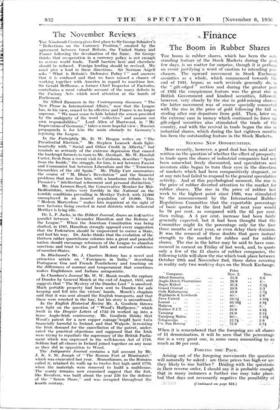THE N ineteenthCentury gives first place to Sir George Soliiister's Reflections on
the Currency Position,' sreated by the agreement between Great Britain, the United- States and France following the devaluation of. the 'franc. r Sir George
thinks that co-operation in a currency policy is. not enough to restore world trade. Tariff barriers here 'and elseWhere should be reduced. Foreign lending should be revived. We
must give a lead in these directions. Sir Norman Angell asks " What is Britain's Defensive Policy 7 and answers
that it is confused and that we have missed a chance of working together with America in regard to maritime law. Sir Gerald Bellhouse, a former Chief Inspector of Factories, contributes a most valuable account of the many defects in the Factory Acts which need attention at the hands of - Parliament.
Sir Alfred Zimmern in the Contemporary discusses " The New Phase in International Affairs," now that the 'League
has, in his view, ceased to be effective and France is no longer supreme. " We must cease to hide behind the screen provided by the ambiguity of the word ' collective' and assume our
own responsibilities." Lord Allen of Hurtwood, in ." My. Impressions of Germany," takes a more hopeful view ; Russian propaganda is for him the main obstacle to Germany's,
rejoining the League. •
In the Fortnightly Mr. D. W. Brogan writes ,on " The Presidential Election." Mr. Stephen Leacock deals light-: heartedly with " Social and Other Credit in Alberta," but reminds us seriously of the extreme depreiiion that caused-. the bankrupt farmers to turn to Mr. Aberhart. Mr. W. Horsfall Carter, fresh from a recent visit to Catalonia, describes " Spain from the Inside," the struggle, for him; is not between Fascist and Communist but between Liberalism and the ", Tenacious hierarchies of the old Spain." Mr. Philip Carr summarises the course of " M. Blum's Revolution " and the fmancial problems that now face him, with a handsome tribute to the Premier's " intellectual refinement and personal distinction." .
Mr. Alan Lennox-Boyd, the Conservative Member for Mid- Bedfordshire, writes very forcibly in the Nutierial on the terrible conditions prevailing in Merthyr Tydvil, with 12,000. unemployed in an insured population of 19,000. This " Modern Martyrdom " makes him impatient at the sight of new factories being erected in rural districts while industrial Merthyr is lying idle.
Dr. L. P. Jacks, in the Hibberl Journal, draws an instructive parallel between " Alexander Hamilton and the Reform' of the League." When the American Constitution was being drafted, in 1787, Hamilton strongly opposed 'every suggestion that the Federation should be empowered to coerce a State, and had his way. Dr. Jacks thinks that the evolution of the thirteen rather quarrelsome colonies into a great and peaceful nation should encourage reformers of the League to abandon sanctions and trust to the good faith and mutual confidence of member-States.
In Blackwood's Mr. J. Chartres Molony has a novel and attractive article on "Foreigners in India," describing Portuguese Goa and French Pondicherry and touching on the differences of manner. and temperament that sometimes makes Englishmen and Indians antagonistic.
In Chambers's Journal Mr. W. W. Marsh recalls the capture of Dundee by General Monek at the end of August, 1651, and suggests that " The Mystery of the Dundee Loot " is unsolved. Much portable property, had been sent to Dundee for safe keeping and fell into the victors' hands. Monek's chaplain said that it was sent aboard-the English transports, and that these were wrecked in the bay; but his story is unconfirmed.
• In the English Historical Review Mr. A. Goodwin throws new light on the question:of " WoOd's -Halfpence," which Swift in the Drapier Letters of 1722-24 worked up -into, a fierce Anglo-Irish controversy. Mr. Goodwin thinks that Wood's patent for a new copper coinagetWx1d -kiaie +een financially harmful to Ireland, and that Walpole,in resisting the Irish _demand for the cancellation of the patent, under- rated the practical objections and supposed that the Irish were trying to repudiate the supremacy of the British Parlia- ment which was expressed in the well-known Act of 1719. Seldom had all classes in Ireland joined together on any issue as they did in opposition to Wood. The Antiquaries Journal contains a full account by Mr. J. K. S. St. Joseph of " The Roman Fort at Biliziseaster," which was excavated last year. .Brariodinium, as the Romans called it; retained its walls up to twelve feet high until 1770, when the materials were removed to build a maithouse. The 'scanty -remains now examined suggest that the fort, like Reculver, was built about the year 250 for the defence of the " Saxon Shore," and was occupied throughout the fourth century.














































 Previous page
Previous page